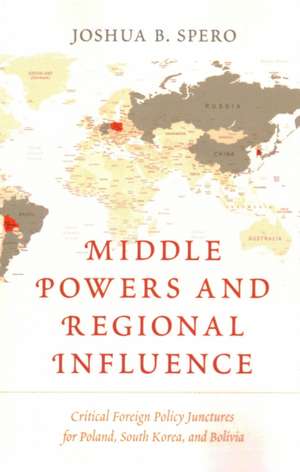Middle Powers and Regional Influence
Autor Joshua B. Speroen Limba Engleză Paperback – 14 noi 2021
| Toate formatele și edițiile | Preț | Express |
|---|---|---|
| Paperback (1) | 349.22 lei 6-8 săpt. | |
| Rowman & Littlefield – 14 noi 2021 | 349.22 lei 6-8 săpt. | |
| Hardback (1) | 808.57 lei 6-8 săpt. | |
| Rowman & Littlefield – 15 noi 2018 | 808.57 lei 6-8 săpt. |
Preț: 349.22 lei
Nou
Puncte Express: 524
Preț estimativ în valută:
66.83€ • 69.38$ • 55.73£
66.83€ • 69.38$ • 55.73£
Carte tipărită la comandă
Livrare economică 22 martie-05 aprilie
Preluare comenzi: 021 569.72.76
Specificații
ISBN-13: 9781538158739
ISBN-10: 1538158736
Pagini: 186
Dimensiuni: 160 x 228 x 20 mm
Greutate: 0.28 kg
Editura: Rowman & Littlefield
ISBN-10: 1538158736
Pagini: 186
Dimensiuni: 160 x 228 x 20 mm
Greutate: 0.28 kg
Editura: Rowman & Littlefield
Descriere
This book builds on prominent middle power literature and aims to advance our theoretical understanding for why crucial foreign policies were made by the "pivotal middle" powers this book examines-Poland, South Korea, and Bolivia.
